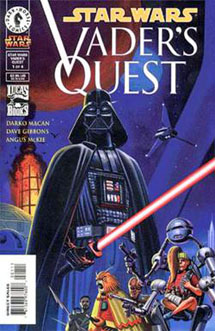Although I’m not religious, I can see the appeal of Bible study — scouring a massive, sometimes contradictory text in order to better understand it. This is because I’m a “Star Wars” Expanded Universe fan. After reading Marvel’s “Star Wars” No. 35, where Darth Vader discovers that a kid named Luke Skywalker destroyed the Death Star, I wondered: So when exactly did Vader definitively learn that Luke is his son? Was it at that moment? Or was there another story that confirmed it for him?
It was with those questions in mind that I read “Vader’s Quest” (1999), a four-issue comic series from Dark Horse that came out after the classic trilogy but before the prequel trilogy. Written by Darko Macan, the series starts with Vader still searching for confirmation, as if he didn’t trust the Rebel he tortured in Marvel No. 35. Like a reporter seeking a second source, Vader tortures another Rebel on the opening panel who says “Skywalker.”
Macan also addresses a common question among “Star Wars” fans: Why did Obi-Wan and the Larses not change Luke’s last name to protect him? A couple of stormtroopers are talking among themselves about the name Vader tortured out of the Rebel: “Oh, Sunblazer, Starkiller, one of those.” Macan essentially suggests that “Skywalker” is like “Johnson” — it’s not a name that stands out in the GFFA.
Macan’s purpose in establishing the commonality of “Skywalker,” I think, is to put Vader in a position where he’s mostly sure that Luke is his son (evidence: the surname, plus Luke’s strength in the Force, which Vader sensed in the Death Star trench run), but still has some doubt (evidence: as far as he knows, he does not have a son, and the name could be a coincidence).
“Star Wars” film enthusiasts might argue that the whole idea behind Marvel No. 35 and “Vader’s Quest” is faulty to begin with, because both Vader and the Emperor learn of Luke Skywalker’s existence as a serious threat in “The Empire Strikes Back,” when Luke’s training with Yoda allows the Emperor to sense him in the Force. Palpatine then shares that knowledge with Vader, who seems mildly surprised. The surprise factor is emphasized more in the 2004 DVD rewrite of the scene when Vader asks “How is this possible?” (The Emperor’s response: “Search your feelings, Lord Vader. You will know it to be true.”)
Although George Lucas might’ve been trying to say that Vader learned of Luke’s existence only at that point, I’d argue that Vader is 90 percent sure that Luke is his son even as “The Empire Strikes Back” begins. Concurrent with this, he is beginning to mistrust the Emperor, who had told him Padme died before giving birth (which the Emperor believed, as well, although he wasn’t concerned with confirming it; he wanted Vader to cleanly split from his past as Anakin). As such, I’ve always assumed that during the Vader-Emperor conversation in “Empire,” Vader already knows Luke is his son, but he’s simply not telling the Emperor what he knows. In the back of his mind, Vader is thinking of teaming up with Luke and overthrowing the Emperor (an offer he indeed makes to Luke later in the film).

So, if we agree that Vader is searching for both Luke’s identity and Luke himself before “Empire,” then “Vader’s Quest” — if only due to its title — seemingly becomes a must-read for “Star Wars” fans. It’s an opportunity to get into Vader’s head in a way that Marvel No. 35 couldn’t, since it was written before “Empire’s” revelations came to light.
But in reality, “Vader’s Quest” might be the most disappointing “Star Wars” comic ever put out. Despite the title, we aren’t privy to Vader’s innermost thoughts (stories like that didn’t emerge until the prequels started rolling out). Like too many “Star Wars” stories with the villain in the title, the author actually shies away from the bad guy. Instead, the main character is a ridiculously egotistical X-wing pilot, Jal, who had the measles during the Battle of Yavin, allowing Luke to use his X-wing and get the glory. Vader’s quest occurs in the background of Jal’s cliched journey of redemption.
The last panel of the last issue tries to go out with a wink, as the Emperor privately refers to Vader as “Skywalker.” But that’s not nearly as juicy as Macan seems to think it is. Even before the prequels came out, we knew the Emperor knew Vader used to be Anakin Skywalker.
So if you’re looking to “Vader’s Quest” — or any Expanded Universe fiction, for that matter — to get a big moment of revelation, or at least Vader’s inner monologue about Luke, or Vader and the Emperor discussing Luke, you’re not going to get it. Such a story simply does not exist during this time period. Rather, Vader’s knowledge that Luke is his son — and what he wants to do with that knowledge — is merely percolating in the back of his mind during this time, like a brilliant idea that doesn’t quite come to the surface. The conversation in “Empire” is Vader’s epiphany, the moment where it firmly clicks.

